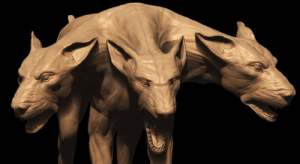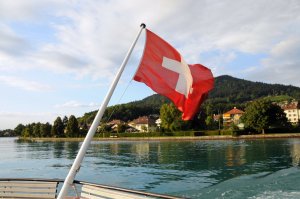Le destin de Zaoua s’achève brutalement à Garissa

Cerberus, the three-headed dog of Hades, created using the Sculpt tool in Blender 2.43, by Giuseppe Canino. (CC BY-SA 2.0).
Réflexion
Cette année, Zaoua✱, une jeune fille Kalenjin, devait se rendre à un stage d’enseignement. Elle n’y participera pas et ne pourra jamais aider ses parents vieillissants. Sa vie, ainsi que celle de 146 autres camarades étudiants, a été subitement écourtée par les balles des terroristes d’Al-Shabab, le 2 avril dernier, le jour de l’attaque de l’Université kenyane de Garissa.
Elle est née et a grandi dans un milieu modeste. Ses parents gardaient quelques animaux : des porcs, des chèvres et des vaches. C’est grâce à leur travail qu’ils ont pu envoyer leur fille aux études. L’école primaire la plus proche était à 10 km et elle avait pris l’habitude de courir cette distance quotidiennement. Malheureusement, ses parents étaient trop pauvres pour lui financer des études au lycée de Kabianga qui était à seulement 2 km de leur demeure. Cette école-là était réservée aux enfants dont les parents avaient des carrières florissantes. La jeune Zaoua est ainsi devenue forte mentalement et physiquement en raison des épreuves de la vie. Elle excellait dans tous les domaines sportifs et dans toutes les disciplines scolaires. Elle avait refusé les conseils d’amis qui lui disaient de quitter l’école pour se concentrer sur la course longue distance, alors même qu’elle était championne de son école pendant plusieurs saisons sur plusieurs distances. Elle a décidé que sa vocation était d’être enseignante. Son rêve était de travailler au lycée Kabianga comme professeur d’éducation physique. Elle désirait donner à ses parents des moyens de subsistance décents, car ils devenaient vieux et frêles. Ils avaient vendu presque tous leurs animaux pour payer ses études. Elle était maintenant une étoile montante dans le village et, pour tous les enfants, elle était un exemple de progrès. Mais sa vie a été réduite à néant par les terroristes d’Al-Shabab le 2 avril dernier à l’Université kényane de Garissa.
Ces faits tragiques ne sont pas nouveaux en Afrique comme dans d’autres parties du monde. En 2014, deux cents jeunes étudiantes ont été enlevées par le tristement célèbre mouvement extrémiste Boko Haram. Beaucoup trop meurent encore tous les jours ou sont déplacés à l’intérieur du Nigeria.
Le massacre de Garissa a provoqué un choc de plus dans un monde émotionnellement fragile qui essaye de retrouver son équilibre après le tragique massacre de la rédaction de Charlie Hebdo, l’attaque meurtrière du musée du Bardo à Tunis ou le crash suicidaire de l’avion de Germanwings. Les images montrant le massacre perpétré à Garissa sont extrêmement difficiles à supporter, mais il est temps de faire face à la réalité.
La voix du silence
Dans de nombreuses cultures, les morts sont hautement respectés. Il n’est même pas souhaitable de diffuser les photos prises des dépouilles. Mais, dans ce cas, le monde a besoin de savoir ce que les fondamentalistes religieux peuvent faire. Ils sont des suceurs de sang insensés. Aucune rationalité chez eux, ils veulent que nous menions leur mode de vie, ils veulent instiller la peur en nous.
Comme Cerbère, le mythique chien à trois têtes qui garde la porte de l’enfer, le terrorisme s’acharne sur le monde moderne, l’éloigne du bonheur et le précipite dans les chambres obscures de la mort, de la peur et de l’incertitude.
Comme étrangers, nous avons pris l’option de garder le silence, parce que nous vivons dans un pays tranquille. Malheureusement, si nous choisissons la voie du silence, nous serons de bons candidats pour l’enfer de Dante Alighieri car les endroits les plus chauds de l’enfer sont réservées à ceux qui, en période de grande crise morale, maintiennent leur neutralité. »
Nous ne devons pas oublier que la Suisse a aussi dû trouver une manière de traiter la menace du fanatisme après les troubles du Sonderbund en 1847.
Un autre défi auquel nous devons faire face est la peur, car il y a tous ceux qui, frileux, ne parlent pas de ces défis. La peur n’empêchera pas nos restaurants, centres commerciaux et écoles de brûler à cause de ces personnes mal intentionnées. Cette manière de faire de la politique et de jongler avec les questions importantes de la réalité conduit à une perte massive de vies.
Nous sommes des barbares
Pourtant, notre génération a beaucoup progressé dans différents domaines. Nous avons été en mesure de faire atterrir à distance un véhicule téléguidé sur Mars. Nous pouvons commander et contrôler des ordinateurs et d’autres appareils qui sont à des milliards de kilomètres d’ici. Nous pouvons parfaitement battre la gravité à son propre jeu alors que nous flottons dans le ciel. Il y a tout juste un demi-siècle, l’homme devait se rendre dans une bibliothèque pour accéder aux informations, alors que nous avons maintenant toutes les bibliothèques du monde dans nos appareils. L’information circule en millisecondes sur des millions de kilomètres.
Médicalement, il y a tellement de progrès que les maladies qui étaient autrefois mortelles sont maintenant traitables. Des greffes du cœur, des reins et même du pénis sont possibles.
Sans une analyse plus approfondie, on pourrait conclure que nous faisons beaucoup mieux que les Vikings ou les Zoulous et que toutes les civilisations anciennes. Mais, quand nous regardons plus profondément ce qui se passe, nous remarquons que nous sommes en réalité des barbares. Nous avons utilisé nos inventions scientifiques pour exterminer nos semblables. Hitler a trouvé qu’il était facile de se lancer dans l’élimination de toute une ethnie avec la science moderne. Plus de 7 millions de tonnes de bombes ont détruits toute vie dans un petit pays appelé Vietnam. En seulement 3 mois, les Tutsis rwandais ont presque complètement disparu de la surface de la Terre en raison de l’absurdité et la haine qui a fomenté ce génocide. Maintenant, c’est grâce aux différents canaux d’information que se répand la haine comme un feu sauvage. Haine à cause de la race, de l’orientation sexuelle, de la religion. De la haine partout. L’éternelle et inquiétante question est: qu’est-ce qui a mal tourné? Si les gens nobles et honorables des forêts Amazoniennes venaient à apprendre ce qui se passe dans le monde moderne, seraient-ils attirés par nos manières de vivre?
✱ Nom d’emprunt
Marcus
Membre de la rédaction valaisanne de Voix d’Exils




